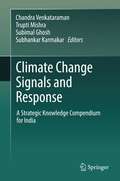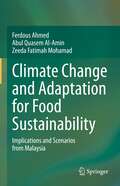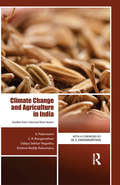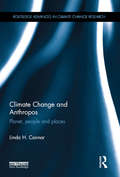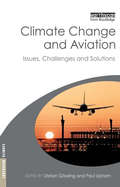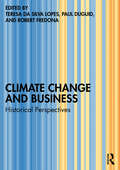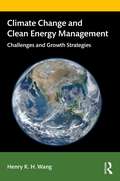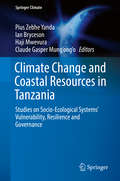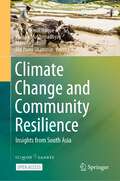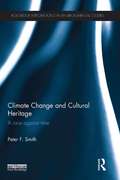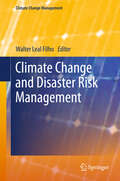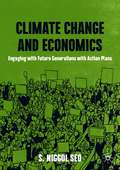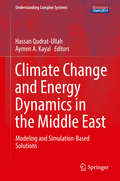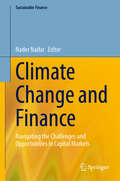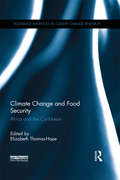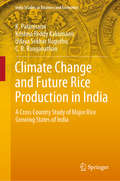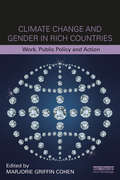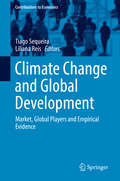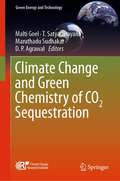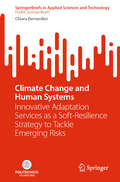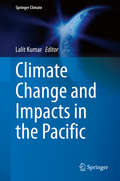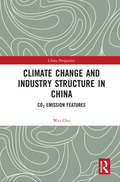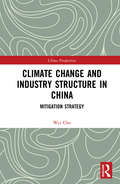- Table View
- List View
Climate Change Signals and Response: A Strategic Knowledge Compendium for India
by Chandra Venkataraman Trupti Mishra Subimal Ghosh Subhankar KarmakarThis book provides a synthesis of research findings, in terms of strategic knowledge outcomes regarding emergence of recent regional climate signals, implications for impacts assessment, and mitigation and adaptation response, relevant in the Indian context. The first part discusses evidence of climate change and its underlying scientific processes across India, chiefly focusing on impacts that are already visible and attributable to anthropogenic activities. The latter part deals with the responses to climate change, highlighting the mitigation and adaptation strategies in various sectors and communities.The book presents a concise interpretation, distilling practical recommendations and policy prescriptions at national and sub-national levels. It serves as a reference point for understanding scientific advances and persisting uncertainty, future vulnerability and response capacity of interlinked human and natural systems, pertaining to India. It is an excellent resource for policy makers and industry watchers in addition to the research fraternity.
Climate Change and Adaptation Planning for Ports (Routledge Studies in Transport Analysis)
by Zaili Yang Adolf K. Ng Austin Becker Stephen Cahoon Shu-Ling Chen Paul EarlAs key links in transportation and supply chains, the effect of climate change on seaports has broad implications for the development prospects of the global economy. However, the picture is very uncertain because the impacts of climate change will be felt very differently around the world, both positively and negatively. This book addresses the need for quality theoretical analysis, highly innovative assessment methodologies, and insightful empirical global experiences so as to identify the best international practices, planning and appropriate policies to effectively adapt to, develop resilience, and indeed benefit from, the impacts posed by climate change on transportation and supply chains. This book comprises of theories, methodologies and case studies from five continents (Asia, Europe, Latin America, North America, and Oceania) addressing climate change and the adaptation planning of ports and transportation infrastructures. With reputable contributors from academic, policymaking and professional sectors, it critically analyses the recent attempts by ports in establishing adaptation plans and strategies so to enhance ports and other transportation infrastructures’ resilience to the climate change risks. This is the first book of its kind to focus on climate change adaptation for ports. It offers useful and comprehensive guidance to senior policymakers, industrial practitioners and researchers who are eager to understand the dynamics between climate change, adaptation planning of ports and transportation infrastructures.
Climate Change and Adaptation for Food Sustainability: Implications and Scenarios from Malaysia
by Ferdous Ahmed Abul Quasem Al-Amin Zeeda Fatimah MohamadThis book assesses the vulnerability impacts of climate change on food security by examining a 50 years scenario (2015- 2065) and following a top-down approach. Importantly, looking at the sustainable food production, the authors compared the cost-benefit of adaptation costs from 2015 to 2065. It was found that a 15% adaptation capacity is more efficient for Malaysia in order to combat the climate change effects on the food sector. This book has developed a quantitative adaptive model namely, the Malaysian Climate and Economy (MCE) model, based on the dynamic Computable General Equilibrium (CGE) modeling structure to examine food sustainability and adaptation strategies. Malaysia experiences an unusual combination of droughts and extreme rainfall events that can be attributed to climate change. These unusual events and consequences leave Malaysian policymakers looking for ways to make Malaysia self-sufficient in terms of agriculture. It is assumed that climate change effects may result in increasing food insecurity and vulnerability in the future. Policy measures are in place to lessen the likely climatic effects overall, but there is an urgent need to develop an adaptation policy for the future.
Climate Change and Agriculture in India: Studies from Selected River Basins
by Udaya Sekhar Nagothu K. Palanisami Krishna Reddy Kakumanu C. R. RanganathanThis book provides an overview of climate change in India using river basin data and analytical and econometric methods. It, first, makes a quantitative assessment of how climate change affects agricultural and food production systems; second, predicts how these systems may respond to climate change; and third, suggests adaptation measures and strategies to improve the income of farmers, increase production, save water and conserve environment.The work will be greatly useful to policy-makers, researchers and teachers of agricultural economics, environmental studies and economics and development studies as also to research organizations dealing with climate modelling and resource management.
Climate Change and Ancient Societies in Europe and the Near East: Diversity in Collapse and Resilience (Palgrave Studies in Ancient Economies)
by Joseph G. Manning Paul Erdkamp Koenraad VerbovenClimate change over the past thousands of years is undeniable, but debate has arisen about its impact on past human societies. This book explores the link between climate and society in ancient worlds, focusing on the ancient economies of western Eurasia and northern Africa from the fourth millennium BCE up to the end of the first millennium CE. This book contributes to the multi-disciplinary debate between scholars working on climate and society from various backgrounds. The chronological boundaries of the book are set by the emergence of complex societies in the Neolithic on the one end and the rise of early-modern states in global political and economic exchange on the other. In order to stimulate comparison across the boundaries of modern periodization, this book ends with demography and climate change in early-modern and modern Italy, a society whose empirical data allows the kind of statistical analysis that is impossible for ancient societies. The book highlights the role of human agency, and the complex interactions between the natural environment and the socio-cultural, political, demographic, and economic infrastructure of any given society. It is intended for a wide audience of scholars and students in ancient economic history, specifically Rome and Late Antiquity.
Climate Change and Anthropos: Planet, people and places (Routledge Advances in Climate Change Research)
by Linda H. ConnorAnthropos, in the sense of species as well as cultures and ethics, locates humans as part of much larger orders of existence – fundamental when thinking about climate change. This book offers a new way of exploring the significance of locality and lives in the epoch of the Anthropocene, a time when humans confront the limits of our control over nature. Many scholars now write about the ethics, policies and politics of climate change, focussing on global processes and effects. The book’s innovative approach to cross-cultural comparison and a regionally based study explores people’s experiences of environmental change and the meaning of climate change for diverse human worlds in a changing biosphere. The main study site is the Hunter Valley in southeast Australia: an ecological region defined by the Hunter River catchment; a dwelling place for many generations of people; and a key location for transnational corporations focussed on the mining, burning and export of black coal. Abundant fossil fuel reserves tie Hunter people and places to the Asia Pacific – the engine room of global economic growth in the twenty-first century and the largest user of the planet’s natural resources. The book analyses the nexus of place and perceptions, political economy and social organisation in situations where environmental changes are radically transforming collective worlds. Based on an anthropological approach informed by other ways of thinking about environment-people relationships, this book analyses the social and cultural dimensions of climate change holistically. Each chapter links the large scales of species and planet with small places, commodity chains, local actions, myths and values, as well as the mingled strands of dystopian imaginings and strivings for recuperative renewal in an era of transition.
Climate Change and Aviation: Issues, Challenges and Solutions (Earthscan Climate Ser.)
by Paul Upham Stefan Gösling'This is a timely, challenging and fascinating book on a topic of central importance to the success or otherwise of our climate change policies. It sets down a clear marker for what has to be done in the aviation sector.' Professor John Whitelegg, Stockholm Environment Institute, University of York, UK 'Climate Change and Aviation presents a clear picture of the transport sector's greatest challenge: how to reconcile aviation's immense popularity with its considerable environmental damage and its dependence on liquid hydrocarbon energy sources. This book avoids wishful thinking and takes the much harder, but more productive, path of considering difficult solutions that clash with short-term and short-sighted expectations about the unlimited growth potential for flying.' Professor Anthony Perl, Urban Studies Program, Simon Fraser University, Canada 'A convincing and timely collection that brings together an impressive range of expertise. The book integrates various perspectives into a powerful core argument - we must do something, and quickly, to tackle the impact of aviation on our environment. The authors recognise the political difficulties associated with promoting change but present constructive options for policy makers. Required reading, especially for transport ministers set on promoting the growth of air travel.' Professor Jon Shaw, Director of the Centre for Sustainable Transport, University of Plymouth, UK Trends such as the massive growth in availability of air travel and air freight are among those which have led to aviation becoming one of the fastest growing emitters of greenhouse gases. These trends have also caused a shift in expectations of how we do business, where we go on holiday, and what food and goods we can buy. For these reasons aviation is (and is set to stay) high up on global political, organizational and media agendas. This textbook is the first to attempt a comprehensive review of the topic, bringing together an international team of leading scientists. Starting with the science of the environmental issues, it moves on to cover drivers and trends of growth, socio-economics and politics, as well as mitigation options, the result being a broad yet detailed examination of the field. This is essential reading for undergraduate and postgraduate courses in transport, tourism, the environment, geography and beyond, while also being a valuable resource for professionals and policymakers seeking a clear understanding of this complex yet urgently pressing issue.
Climate Change and Business: Historical Perspectives
by Paul Duguid Robert Fredona Teresa da Silva LopesClimate change is the greatest market failure in world history and thus the most urgent challenge in the world of business for the foreseeable future. This book brings together experts to shed light on the historical impact of business on climate change and of climate change on business.The book shows how corporate responses to climate change emerged out of earlier environmental concerns, regulatory frameworks, and in many cases already established business strategies. Contributors to the book analyse the evolution of business strategies to navigate environmental challenges even before climate crisis was widely recognised as an urgent concern.The historical insights presented by this book will be essential reading for business historians, as well as students, scholars, and reflective practitioners with an interest in the environment, political economy, business strategy, and risk management.
Climate Change and Clean Energy Management: Challenges and Growth Strategies
by Henry K. WangClimate change has never been more important than it is now, as it has become arguably the world’s most urgent problem. Solving this problem is proving difficult and complex as it involves joint efforts by governments, companies, communities and innovators. The increased use of fossil fuels associated with global economic growths has led to rising GHG emissions and global warming. There are many challenges for countries that are enacting new climate and clean energy regulations in line with their Paris Agreement commitments. Good government policies and corporate strategies are essential to support these efforts as part of the global climate change crisis. This important book addresses the latest climate change impacts and developments in potential mitigation strategies. These include fossil to clean energy transition, smart low carbon city designs, green transportation, electric vehicles, green agriculture, carbon emission trading, carbon capture solutions plus climate finance and risk management. Potential new policies and strategies to support the successful implementation of these important strategic areas are discussed together with high-level country and business case examples. This book is essential reading for policy makers, government employees, business executives, professionals, researchers and academics alike looking to affect change to global climate and energy policies.
Climate Change and Coastal Resources in Tanzania: Studies on Socio-Ecological Systems’ Vulnerability, Resilience and Governance (Springer Climate)
by Pius Zebhe Yanda Ian Bryceson Haji Mwevura Claude Gasper Mung'Ong'OThis volume synthesizes research from a five year program supported by the Norwegian Agency for Development to assess how coastal communities in Tanzania can adapt to climate change impacts such as sea level rise, and better assert their rights to implement decisions regarding coastal resource management in the context of global climate change. Throughout ten chapters, the book deploys a holistic approach to adopt a conceptual model of socio-ecological systems, and characterize human-nature interactions in an integrative way to understand anthropogenic pressures on ecosystems to guide conservation and management. The book will be of interest to researchers, students studying environmental management and climate change, planners, and policy makers. The book begins by describing the biophysical and socio-economic characteristics of the Tanzanian coastal environment, then discusses the impacts of climate change on coastal resource governance, community vulnerability, and livelihood security. Then, intervention strategies are offered as a means for local communities to not only adapt to climate change impacts, but also to engage in decision-making processes to assess vulnerabilities and address challenges and limitations through educated measures. The final chapters discuss the vulnerability and adaptation of coastal communities to climate change impacts to assess how livelihoods are constructed in response to impacts, and summarize the key findings to determine the best adaptation strategies to improve adaptive capacity and reduce socio-economic vulnerability.
Climate Change and Community Resilience: Insights from South Asia
by Pranab Mukhopadhyay A. K. Enamul Haque Mani Nepal Md Rumi ShamminThis open access book documents myriads of ways community-based climate change adaptation and resilience programs are being implemented in South Asian countries. The narrative style of writing in this volume makes it accessible to a diverse audience from academics and researchers to practitioners in various governmental, non-governmental and international agencies. At a time when climate change presents humanity with a gloomy future, the stories of innovation, creativity, grassroots engagement and locally applicable solutions highlighted in this book provides insights into hopeful ways of approaching climate solutions. South Asian countries have been dealing with the impact of climate change for decades and thus offer valuable learning opportunities for developing countries within and beyond the region as well as many western countries that are confronting the wrath of climate induced natural disasters more recently.SANDEE has been a pioneer in the development of research and training in environmental economics and related issues in South Asia and Prof Maler has been throughout SANDEE's history, its mentor, and its strongest supporter. Many young economists in South Asia have significantly benefited from Prof Maler's guidance and inputs. The present volume on “Climate Change and Community Resilience: Insights from South Asia” is a fitting tribute and an excellent reflection of Prof Maler's contributions to the SANDEE programme throughout his association.- Mahesh Banskota, Ph.D.Professor, Development StudiesSchool of Arts, Kathmandu UniversityThis comprehensive volume aptly identifies grassroots initiatives as the core of the problem of adaptation to climate change. The analysis of the different experiments is lucid, inclusive, and full of interesting detail. The methodologies used and the subjects covered span a range of frameworks and narratives. Put together, the studies are a fitting tribute to Karl-Goran Maler, who spent years putting his impeccable expertise to use for the cause of enhancing research in South Asia.- Kanchan Chopra, Ph.D.Former Director and Professor, Institute of Economic Growth, Delhi, and Fellow, SANDEEThe slow international policy response to climate change elevates the importance of understanding how communities can respond to climate change’s many threats. This unusually accessible volume provides that understanding for South Asia while being relevant to the rest of the world. Its emphasis on research by scholars from the region makes it a wonderful tribute to Prof. Karl-Göran Mäler, who contributed so much to the growth of environmental economics research capacity in South Asia.- Jeffrey R. Vincent, Ph.D.Clarence F. Korstian Professor of Forest Economics & ManagementNicholas School of the Environment, Duke University, USA
Climate Change and Cultural Heritage: A Race against Time (Routledge Explorations in Environmental Studies)
by Peter F. SmithHistory reveals how civilisations can be decimated by changes in climate. More recently modern methods of warfare have exposed the vulnerability of the artefacts of civilisation. Bringing together a range of subjects - from science, energy and sustainability to aesthetics theory and civilization theory - this book uniquely deals with climate change and the ensuing catastrophes in relation to cultural factors, urbanism and architecture. It links the evolution of civilisation, with special emphasis on the dynamics of beauty as displayed in architecture and urbanism, to climate change. It then considers both the historic and predicted impacts of climate change and the threat it poses to the continued viability of human civilisation when survival is the top priority. This book gives students, researchers and professionals in architecture and sustainable design as well as anyone interested in the threat of global warming to civilisation, new insights as to what could be lost if action is not taken at a global level.
Climate Change and Disaster Risk Management (Climate Change Management #0)
by Walter Leal FilhoThere has been some degree of reluctance in the past to consider disaster risk management within the mainstream of adaptation to climate variability and climate change. However, there is now wide recognition of the need to incorporate disaster risk management concerns in dealing with such phenomena. There is also a growing awareness of the necessity for a multi-sectoral approach in managing the effects of climate variability and climate change, since this can lead to a significant reduction of risk. This book presents the latest findings from scientific research on climate variation, climate change and their links with disaster risk management. It showcases projects and other initiatives in this field that are being undertaken in both industrialised and developing countries, by universities and scientific institutions, government bodies, national and international agencies, NGOs and other stakeholders. Finally, it discusses current and future challenges, identifying opportunities and highlighting the still unrealised potential for promoting better understanding of the connections between climate variation, climate change and disaster risk management worldwide.
Climate Change and Economics: Engaging with Future Generations with Action Plans
by S. Niggol SeoThis textbook provides a broad introduction to the relationship between climate change, economics, and climate policy for young readers and future generations. It highlights the problem of intergenerational gaps and burden sharing on climate change. Taking on major contentious issues of today, it is rich with behavioural strategies and real life experiences which are explained in an accessible and engaging way. A diverse range of topics are covered, including farm animals of Sub-Sahara, Latin American rainforests, Indian monsoon agriculture, tropical cyclones in Bangladesh, sublime grasslands, energy revolutions, hydroelectric dams of China, backstop technologies, ocean exchanges with the atmosphere, mass extinction of species, commercial fisheries, infectious diseases and pandemics, and a climate policy big deal. Climate Change and Economics: Engaging with Future Generations with Action Plans aims to engage with young readers and offer action plans for activists. It is relevant to students interested in environmental economics and environmental science.
Climate Change and Energy Dynamics in the Middle East: Modeling and Simulation-Based Solutions (Understanding Complex Systems)
by Hassan Qudrat-Ullah Aymen A. KayalThis edited volume presents chapters on the dynamics of global climate change and global warming in the Middle East. In this region, it should be noted that even slightly warmer weather can result in an increased demand of energy along with its lower supply, as well as lower labor productivity. This text focuses on modeling, simulation, system dynamics, and agent-based modeling in dealing with these issues. The latest decision making tools, techniques, and innovative solutions used to overcome these challenges are presented.Many distinguished researchers contribute their work herein. The audience for this volume includes policy makers, researchers, and students unified by the common goal of making better decisions in the sustainable production and consumption of energy. The practical orientation of the chapters within each part is intended to suit the practitioners: managers and decision makers in the energy sector of the Middle East region.
Climate Change and Finance: Navigating the Challenges and Opportunities in Capital Markets (Sustainable Finance)
by Nader NaifarFinancial markets play a critical role in climate finance as they are a major source of funding for many of the projects and initiatives aimed at addressing climate change. For instance, banks and investors can provide loans and capital to companies that are developing renewable energy projects, building energy-efficient infrastructure, or implementing climate-smart agricultural practices. Moreover, the importance of climate finance in financial markets goes beyond just funding environmental initiatives. Investors and financial institutions are increasingly factoring in climate risks and opportunities into their decision-making processes, including assessing the financial risks posed by climate change and the potential impact of new regulations and policies aimed at reducing greenhouse gas emissions.This book is a collection of recent developments in climate change and climate finance. As the global community seeks to address the impacts of climate change, financial institutions are being called upon to play a larger role in supporting the transition to a sustainable economy. This includes incorporating climate risks into investment decisions, developing new financial products that support climate-friendly investments, and promoting greater transparency and accountability in the financial sector. The book provides a comprehensive analysis of how climate change is impacting the global financial system and explores the potential solutions that can help address these challenges. The contributions aim to examine the complex interplay between climate change and finance, and the potential for innovative financial instruments and policies to support the transition to a low-carbon economy.
Climate Change and Food Security: Africa and the Caribbean (Routledge Advances in Climate Change Research)
by Elizabeth Thomas HopeGlobal climatic change has resulted in new and unpredictable patterns of precipitation and temperature, the increased frequency of extreme weather events and rising sea levels. These changes impact all four aspects of food security – availability, accessibility, stability of supply and appropriate nourishment – as well as the entire food system – food production, marketing, processing, distribution and prices. Climate Change and Food Security focuses on the challenge to food security posed by a changing climate. The book brings together many of the critical global concerns of climate change and food security through local cases based on empirical studies undertaken in Sub-Saharan Africa and the Caribbean. Focusing on risk reduction and the complex nature of vulnerability to climate change, the book includes chapters on the responsiveness of farmers based on traditional knowledge, as well as the critical phenomenon of food insecurity in the urban setting. Other chapters are devoted to efforts made to strengthen resilience through long-term development, with interventions at the regional and national levels of scale. It also examines cross-cutting themes that underlie the strategies employed to achieve food security, including equity, gender, livelihoods and governance. This edited volume will be of great interest to students and scholars of climate change, food security, environmental management and sustainable development.
Climate Change and Future Rice Production in India: A Cross Country Study of Major Rice Growing States of India (India Studies in Business and Economics)
by Udaya Sekhar Nagothu K. Palanisami Krishna Reddy Kakumanu C. R. RanganathanThis book explains in depth the issues and challenges faced by rice farmers in India in relation to production and productivity, and the possible adaptation strategies to climate change. Based on five years of groundbreaking research on emerging trends in cultivation in major rice growing regions in India, it begins by describing production and yield trends across different rice growing regions. It then offers a comprehensive review of relevant literature and the quantification methodologies and approaches used to analyze the impact of climate change. The book also analyzes climate change impacts on rice productivity and production, applying field-tested quantification methods, such as the Just-Pope production function where time series and cross-section data are simultaneously used for all regions. The results are presented for five geographical regions of India – northern, eastern, western, central and southern – for better comparison and readability. The analyses cover scenarios for both mid-century (2021–2050) and end-century (2071–2100), and in the context of climate change, they also incorporate both medium and high carbon emission scenarios. Thus the future rice production and productivity trends are clearly projected for making necessary interventions. Lastly, the book outlines the essentials of an enabling environment policy and discusses the institutional and policy options necessary to ensure sustainable rice production in India. It also makes the case for introducing appropriate and affordable adaptation strategies to support farmers in different rice-growing regions. The cost–benefit analysis of strategies presented in this book provides an invaluable tool for officials at agriculture departments planning up-scaling of agricultural productivity. The projections are also useful for policy makers and planners developing future investment plans to support rice production in their country. Overall, this book is of interest to a wide audience, including professionals and business enterprises dealing with rice, as well as to academic researchers and students.
Climate Change and Gender in Rich Countries: Work, public policy and action
by Marjorie Griffin CohenClimate change is at the forefront of ideas about public policy, the economy and labour issues. However, the gendered dimensions of climate change and the public policy issues associated with it in wealthy nations are much less understood. Climate Change and Gender in Rich Countries covers a wide range of issues dealing with work and working life. The book demonstrates the gendered distinctions in both experiences of climate change and the ways that public policy deals with it. The book draws on case studies from the UK, Sweden, Australia, Canada, Spain and the US to address key issues such as: how gendered distinctions affect the most vulnerable; paid and unpaid work; and activism on climate change. It is argued that including gender as part of the analysis will lead to more equitable and stronger societies as solutions to climate change advance. This volume will be of great relevance to students, scholars, trade unionists and international organisations with an interest in climate change, gender, public policy and environmental studies.
Climate Change and Global Development: Market, Global Players and Empirical Evidence (Contributions to Economics)
by Tiago Sequeira Liliana ReisThis book presents new research related to climate change policies and effects. It discusses the implications of climate change on issues pertaining to international relations and economic development, and the question of how climate change could jeopardize the international system as we have known it until today. It aims to provide an empirical basis and epistemological framework to discuss the effects of climate change on economic growth, social development and welfare as a global phenomenon influenced by policies carried out transnationally and by national governments. Case studies from around the globe are presented.
Climate Change and Green Chemistry of CO2 Sequestration (Green Energy and Technology)
by T. Satyanarayana Malti Goel Maruthadu Sudhakar D. P. AgrawalThe book comprises state-of-the-art scientific reviews on carbon management strategies in response to climate change. It provides in-depth information on topics relating to recent advances in carbon capture technology and its reuse in value added products. It features contributions of leading scientists and technocrats on topics including climate change and carbon sequestration, lowering carbon footprint CO2 capture, low carbon imperatives in oil industry, CO2 as refrigerant in cold-chain application, carbonic anhydrase-mediated carbon sequestration and utilization, chemical looping combustion with Indian coal, CO2 conversion to chemicals, algae based biofuels, and carbon capture patent landscaping analysis. The contents of this book will be helpful for research scholars, post-graduate students, industry, agricultural scientists and policy makers/planners.
Climate Change and Human Systems: Innovative Adaptation Services as a Soft-Resilience Strategy to Tackle Emerging Risks (SpringerBriefs in Applied Sciences and Technology)
by Chiara BernardiniThis book offers a thorough review of studies on climate change and urban adaptation strategies and plans. It takes the moves from the identification of three primary barriers to adaptation, including the uncertainty surrounding climate change and its evolution, the complexity of human systems, and the widespread perception that climate change impacts are improbable. From this analysis arises the idea of the need to adopt a new approach to the climate issue: the soft approach. This approach focuses on the intangible and organizational aspects of systems and is proposed as a valid alternative in contexts of high uncertainty. It complements the structural (hard) option in response to emerging risks. Furthermore, soft solutions have intrinsic characteristics of flexibility, reversibility, adaptability, scalability, and cost-effectiveness, making them often low-regret and co-benefit. Based on these principles, the book suggests that a climate-wise reorganization of urban services couldconstitute an effective soft strategy to help cities tackle the impacts of climate change and investigates the potential for Urban Facility Management services to evolve through their integration with climate information. The concept of urban Adaptation services, which integrate knowledge and practices of climate services into urban services management processes, is an innovative perspective which stems from a reading of reality through the lens of specific needs.
Climate Change and Impacts in the Pacific (Springer Climate)
by Lalit KumarThis edited volume addresses the impacts of climate change on Pacific islands, and presents databases and indexes for assessing and adapting to island vulnerabilities. By analyzing susceptibility variables, developing comprehensive vulnerability indexes, and applying GIS techniques, the book's authors demonstrate the particular issues presented by climate change in the islands of the Pacific region, and how these issues may be managed to preserve and improve biodiversity and human livelihoods. The book first introduces the issues specific to island communities, such as high emissions impacts, and discusses the importance of the lithological traits of Pacific islands and how these physical factors relate to climate change impacts. From here, the book aims to analyze the various vulnerabilities of different island sectors, and to formulate a susceptibility index from these variables to be used by government and planning agencies for relief prioritization. Such variables include tropical cyclones, built infrastructures, proximity to coastal areas, agriculture, fisheries and marine resources, groundwater availability, biodiversity, and economic impacts on industries such as tourism. Through the categorization and indexing of these variables, human and physical adaptation measures are proposed, and support solutions are offered to aid the inhabitants of affected island countries. This book is intended for policy makers, academics, and climate change researchers, particularly those dealing with climate change impacts on small islands.
Climate Change and Industry Structure in China: CO2 Emission Features (China Perspectives)
by Chu WeiAs carbon dioxide is the most significant source of greenhouse gases today, its emission quantity has become a primary focus of governments, scholars and the general public. From the perspective of industrial structure, the book mainly explores the features of carbon emissions in China. The author thoroughly studies related theories and literature about industrial structure and climate change, and reviews the different development histories of developed countries and China. Based on historical data, this volume discusses the influence of interprovincial industrial structure and income level on carbon emissions, and tries to estimate different industrial sectors' carbon emissions. It especially studies the case of Zhejiang Province, and analyses several factors which affect CO2 emissions. The book provides international readers with rich information about the characteristics, patterns and drivers of China’s CO2 emissions, which will definitely help scholars and students better understand China's economy.
Climate Change and Industry Structure in China: Mitigation Strategy (China Perspectives)
by Chu WeiIn order to effectively address global warming, many countries have significantly reduced the amount of carbon dioxide emissions that are put into the atmosphere. From the perspective of industrial structure, this volume examines the emission reduction potentials and abatement costs in China. By making an empirical analysis of the emission reduction, the author proposes some practical strategies. The book comprehensively summarizes related theories and research of contaminant disposal modeling, and estimates the shadow price of interprovincial CO2 emissions, the emission reduction potential of different regions, and the marginal emission reduction cost based on the parametric model. It finally puts forward the strategy to adjust the industrial structure in China. The book hence provides solid evidence for policy-makers to help mitigate CO2 emissions through industrial restructuring strategy.
